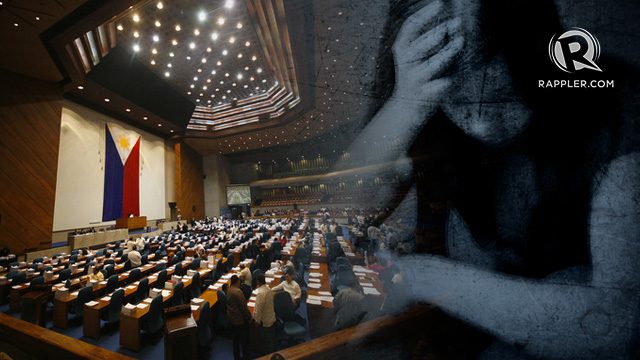SUMMARY
This is AI generated summarization, which may have errors. For context, always refer to the full article.


MANILA, Philippines – On World Mental Health day, October 10, the House of Representatives approved on second reading a bill that spells out the rights of persons with mental health problems. (READ: How does the PH fare in mental health?)
House Bill Number 6452 or the “Comprehensive Mental Health Act” also states that “every person” should have access to “the best available” mental health care.
The bill also lists the rights of persons with mental illnesses:
- “Human treatment and respect for the inherent dignity of the human person”
- Protection from forms of abuse and discrimination
- The right to express civil, political, economic, social, and cultural rights
- Access to quality treatment and “aftercare and rehabilitation when possible” to facilitate social inclusion
- Access to information about their disorder and services available to address it
- “To live and work in the community, to the extend possible”
- Access to legal representatives and carers of their choice
- Confidentiality of all information unless a law requires disclosure, a person has given express or implied consent to its disclosure, there is good reason to believe that specific persons or groups are in threat without the disclosure
- Access to their own medical records unless the attention mental health professional thinks it would harm the patient and others
- Should their records be withheld, the person of legal representative may contest this before an internal review body or the Commission on Human Rights
The bill states that a mental health patient may not be put in solitary confinement. HB 6425 likewise spells out the rights of family members, carers, legal representatives, and health care professionals.
The following functions are also assigned to government agencies:
The Department of Health (DOH) is tasked to craft a national mental health program in coordination with stakeholders. It will also need to make sure that all mental health facilities are assessed and maintain a “safe, therapeutic, and hygenic environment” with adequate privacy. It is also tasked to make sure that research is being done on mental health and that it is integrated into our health information system.
It will also have to coordinate with the Philippine Health Insurance Corporation to make sure that proper packages are made available to mental health patients. Human rights training for health personnel and staff are also expected from the department.
It is also tasked to improve awareness campaigns on “stigmatized medical conditions”, including psoriasis, HIV-AIDS, and Hansens disease.
The Commission on Human Rights (CHR), meanwhile, is tasked to inspect mental health facilities to make sure patients are not subject to cruel, inhumane, or degrading conditions.
It will also create mechanisms to check and act on abuses in the treatment and care of mental health patients, particularly when the treatments are imposed involuntarily.
The commission is the main body tasked to protect and promote the rights of the mentally ill.
Those who violate the provisions in the bill – once it becomes law, as well as when its implementing rules and regulations take effect – face a fine of not less than P10,000 or imprisonment between 6 months to 2 years.
Other key points of the bill include:
- The provision of mental health services in all regional, provincial, and tertiary hospitals
- Mandating local government units in creating or upgrading hospitals and facilities with personnel trained to address psychiatric facilities
- The provision of mental health services for drug dependents who voluntarily submit under the Comprehensive Dangerous Drugs Act of 2002
The bill also strengthens the Philippine Council for Mental Health.
Read HB 6425, as passed on 2nd reading, here:
The Senate version of the bill had earlier passed on 3rd and final reading in May 2017.
The bill’s sponsors in the House include Quezon 4th District Representative Helen Tan, Antipolo City 1st District Representative Cristina Roa-Puno, Marikina City 2nd District Representative Romero Quimbo, and Davao City 1st District Representative Karlo Nograles.
The current version being tackled before the House is a consolidation of several other versions of a mental health bill filed before the 17th Congress. – Rappler.com
Add a comment
How does this make you feel?
There are no comments yet. Add your comment to start the conversation.